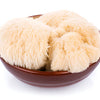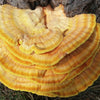Lion’s Mane Mushrooms: Your Complete Guide To Dosage And Benefits
Medicinal mushrooms are going through nothing short of a Da Vinci-esque renaissance, and the humble Lion's Mane mushroom has played a pretty significant part in that re-rise to fame.
Packed to the very brim with therapeutic, wellness-boosting compounds, Lion's Mane is one of the few functional mushrooms that not only support brain health, digestion, nerve function, and mental clarity but also taste so damn good.
Here at Marley One, we believe informed choices lead to better wellness, so we've put together this complete guide on Lion's Mane mushrooms.
We'll cover the best dosage, how to incorporate them into your daily routine, their surprisingly wide-ranging benefits, and the (very rare) side effects so you can make the best decisions for your health and wellness.
What is Lion’s Mane, and why is it popular?
Hericium erinaceus, or Lion's Mane mushrooms in the West, Yamabushitake in Japan, and Hou Tou Gu in China, is a white, fluffy mushroom that (only slightly) resembles the mane of a lion. Delicious and nutritious, with a unique texture and taste, it's been used in traditional Eastern medicine for centuries (and further afield) to support overall health.
The history and traditional uses of Lion’s Mane
Lion's Mane has been used in Traditional Chinese Medicine (TCM) (and throughout Japan and Korea) for thousands of years, but it's not just our Eastern friends who dipped their toes into the benefits of this highly functional mushroom. Native to many parts of the globe, these shaggy little nuggets of goodness were also used by the First Nations people throughout the Americas, Ancient Greece, Rome, and Russia for their healing properties.
But, as with many folk/traditional health practices, their use and popularity slowly fell out of favor in Western cultures during the rise of pharmaceuticals during the scientific revolution.
It's really only in the last 30 or so years that Western science has started to give this wellness powerhouse the attention it deserves - particularly for Lion's Mane mushroom's potential in neuroprotection, cognitive enhancement, gastrointestinal health, immune support, and more...
What do they taste like?
How many functional/medicinal mushrooms actually taste good? Not many - most are more suited to being steeped in tea or taken as a tincture than fried up with garlic and butter.
But Lion's Mane?
If you're a fan of the creamy, velvety texture of lobster, chances are you're going to be a Lion's Mane fan too. The flavor is mild and subtle, but still purely umami/meaty (though, obviously plant-based). Exactly what most of us are looking for in terms of food that's also a functional medicine - delicious, versatile, and somehow both bold and unassuming.
Does cooking Lion’s Mane reduce its health benefits?
Yes and no. Cooking Lion’s Mane mushrooms doesn’t significantly reduce their core health benefits, but how you prepare them definitely matters.
Heat-stable compounds like beta-glucans and polysaccharides, which support immune function, gut health, and cognitive performance, remain intact even after cooking. In fact, gentle cooking methods like sautéing or steaming can make these nutrients more bioavailable by breaking down chitin, the tough fiber in mushrooms.
However, prolonged exposure to high heat can degrade certain antioxidants and delicate nutrients. Always use low to medium heat and avoid excessive frying or boiling when cooking Lion's Mane Mushrooms, but to get the absolute most from your Lion's Mane...
Check out our One Mind - Lion's Mane & Ginkgo Biloba Tincture and One Mind Watermelon Gummies - Lion’s Mane Extract and Ginkgo Biloba Extract. We take the greatest care to ensure that every single therapeutic compound offered by the Lion's Mane is extracted and available in a form that's not only tasty, but also incredibly easy for your body to absorb.
What are the key health benefits of Lion’s Mane mushrooms?
Supports brain health and cognitive function through nerve regeneration and recovery
The past decade has brought with it a huge amount of interest in neuroprotective compounds, and with it, emerging science on the benefits of Lion's Mane mushroom for brain function.
A 2018 study published in Behavioral Neurology found that Lion's Mane supplementation significantly improved nerve regeneration. Preclinical studies also showed improvements in ischemic stroke, Parkinson's disease, Alzheimer's disease, and depression.
The authors of the study concluded that regularly taking Lion's Mane mushrooms "can promote functional recovery and enhance nerve regeneration".
Enhances mood and reduces anxiety and depression
Anxiety and depression are often linked to neuroinflammation and neurotransmitter imbalances. Research suggests Lion’s Mane mushrooms can help regulate these systems quite dramatically.
A 2023 study in Nutrients found that Lion’s Mane reduces oxidative stress, promotes nerve growth, and modulates serotonin and dopamine, helping to ease anxiety and depression. The study concluded that "Hericium erinaceus may alleviate depression and anxiety through modulation of neurotrophic factors and reduction of oxidative stress."
Bioactive compounds like erinacines and hericenones also stimulate nerve growth factor (NGF), supporting neural repair and resilience. These findings suggest the therapeutic compounds in Lion’s Mane can help fight the underlying causes of anxiety and depression, providing relief long-term.
Strengthens immune system and gut health
We are only just starting to fully understand the crucial role that gut health plays in our overall physical and mental well-being. The gut is responsible for over 70% of our immune system and contains over 100 million neurons, making it often referred to as the "second brain".
A 2023 study published in Biology found that Lion’s Mane supplementation significantly improved gut microbiota composition, increasing beneficial bacteria while reducing harmful strains. The researchers observed that these microbial shifts contributed to enhanced gut barrier integrity, improved digestion, and better immune resilience.
The authors also highlighted Lion’s Mane’s immunomodulatory effects, showing that its polysaccharides can stimulate macrophages, natural killer (NK) cells, and other immune-related pathways.
They concluded, "Hericium erinaceus promotes gut microbiota balance and enhances immune function through its prebiotic and anti-inflammatory properties."
Anti-inflammation and antioxidant effects
Inflammation is a major contributing factor to many chronic diseases, including heart disease, diabetes, cancer, and neurodegenerative disorders.
The anti-inflammatory effects of Lion's Mane mushrooms have now been well-documented. A 2023 study published in the International Journal of Molecular Sciences found that Lion’s Mane lowers pro-inflammatory cytokines like TNF-α and IL-6, which are linked to Alzheimer’s and Parkinson’s disease. It also boosts antioxidant enzymes like SOD and GPx, helping to neutralize harmful free radicals and prevent cell damage.
Beyond brain health, Lion’s Mane supports gut and immune function by regulating inflammation and promoting microbiome balance. Researchers have shown that its anti-inflammatory and antioxidant properties contribute to neuroprotection and overall health, making it a valuable natural supplement.
Other health benefits
Lion's Mane mushrooms have also been linked to a huge range of other health benefits, including:
- Supporting cardiovascular health by lowering cholesterol levels and reducing inflammation
- Protecting against certain types of cancer through its antioxidant and anti-inflammatory effects
- Improving digestion and relieving digestive disorders like IBS and stomach ulcers
How much Lion’s Mane should you take? (Dosage guide)
Finding the perfect Lion’s Mane dosage depends on your health needs and goals. There is no one-size-fits-all approach to medicinal mushrooms, as everyone will react at least slightly differently to them.
But, as a general guideline:
- Cognitive function and focus: 500–1,500 mg per day
- Nerve regeneration and neuroprotection: 1,000–3,000 mg per day
- Mood and anxiety relief: 500–1,500 mg per day
- Immune and gut health support: 1,000–2,500 mg per day
How long does it take to feel the effects?
- Short-term benefits (focus and clarity) should be noticeable within the first few days of taking Lion’s Mane.
- Long-term benefits (nerve regeneration, mood improvement, immune support) may take 2–4 weeks or longer for noticeable changes to become apparent.
Should you cycle Lion’s Mane?
You might have seen the term cycling thrown around regarding medicinal mushrooms and supplements. Cycling simply refers to taking breaks from a supplement, typically for a few days per week, before resuming use.
This is done to prevent your body from building up a tolerance to the supplement, but at this point, there is no evidence that suggests Lion's Mane requires cycling. That said, it may be worth experimenting with taking breaks and observing any changes in its effects on you.
Some people prefer 5 days on and 2 days off for long-term use.
Are there any side effects?
Most studies have found no significant side effects, but some people may experience mild digestive discomfort, drowsiness, and skin irritation. As with any supplement, it's best to start with a low dose and monitor how your body reacts.
The best ways to take Lion’s Mane mushrooms
Supplements (tinctures)
In this brave new world of health and wellness, the trend towards extracts and away from whole foods has become increasingly popular. Extracts are a concentrated form of the active compounds in Lion's Mane, and there are a few key reasons why they have taken over the market in recent years:
- Convenience: Supplements offer a quick and easy way to get a daily dose without having to prepare or cook anything.
- Higher potency: Extracts are often standardized to contain higher levels of active compounds, so you can be sure you're getting a consistent dose every time.
- Longer shelf-life: Fresh (and even dried or powdered) mushrooms have a limited shelf life and require proper storage conditions. Supplements, when bought from a reputable source, have a much longer shelf-life.
- Easy to dose: Supplements offer a precise way to measure your daily intake without having to go to the effort of weighing out a dose or using dried mushrooms.
Lion's Mane Tinctures are best taken sublingually (under your tongue) to maximize absorption and effectiveness but can also be added to tea, smoothies, or other beverages.
Always look for organic, non-GMO, and certified medicinal mushroom supplements to ensure you're getting the best quality product. That is exactly what we offer here at Marley One, with our One Mind - Lion's Mane & Ginkgo Biloba Tincture.
Edibles
Prefer a slightly more discreet, and super tasty way of ingesting Lion's Mane?
Enter edibles, or in most cases, mushroom gummies. Made from whole Lion's Mane mushrooms and often infused with other therapeutic ingredients, gummies are quickly becoming a popular way to get your daily dose of medicinal mushrooms.
They offer much of the same benefits as supplements but in a more convenient and delicious form. Plus, they're perfect for those who don't like the taste of mushrooms or struggle to swallow pills. Our One Mind Watermelon Gummies - Lion’s Mane Extract and Ginkgo Biloba Extract fit the bill, and with a potent blend of Lion's Mane and Ginkgo Biloba, they're perfect for boosting cognitive function and supporting brain health.
Cooking with Lion's Mane
If you prefer a more traditional approach to incorporating medicinal mushrooms into your diet, you can always cook with whole or dried Lion's Mane mushrooms. They work as the perfect meat substitute, and taste better than almost any other fungi variety out there. You can use them to make hearty vegetarian meals like stir-fries, soups, and stews.
But remember, exposure to heat reduces the potency of certain compounds in mushrooms, so you may not experience all of the benefits compared to taking a supplement.
Frequently Asked Questions (FAQs)
What is the best dosage for beginners?
That depends on why you are taking Lion's Mane, but starting with 500 mg daily and then gradually increasing the dose over a four-week period is a safe approach.
Is Lion’s Mane safe for children?
While there is limited clinical research to pull from, Lion's Mane mushrooms are as safe as any other edible fungi. If you want to give your child Lion's Mane, start with a low dose and monitor their reaction.
Can I take Lion’s Mane with coffee or tea?
Yes! Our One Mind - Lion's Mane & Ginkgo Biloba Tincture is the perfect addition to any beverage, hot or cold.
Does Lion’s Mane work immediately?
Some effects are felt within hours, while others take a longer time to become noticeable. It varies from person to person, but most people report positive effects within the first few days of use.
Where can I buy high-quality Lion’s Mane mushroom extracts?
Right here at Marley One, we pride ourselves on providing the highest-quality organic, non-GMO, and certified medicinal mushroom supplements.
Final thoughts
There really is no right or wrong way to take Lion's Mane mushrooms. Whether you prefer supplements, edibles, or cooking with whole mushrooms, the benefits that come along with adding this powerful adaptogen to your routine are endless.
Experiment with different ways of taking it and find what works best for you. Remember to always source your products from a trusted and reputable supplier like Marley One.
- Posted in:
- Ideal amount of Lion’s Mane
- Lion’s Mane daily dosage
- Lion’s Mane dosage guide
- Recommended Lion’s Mane intake




